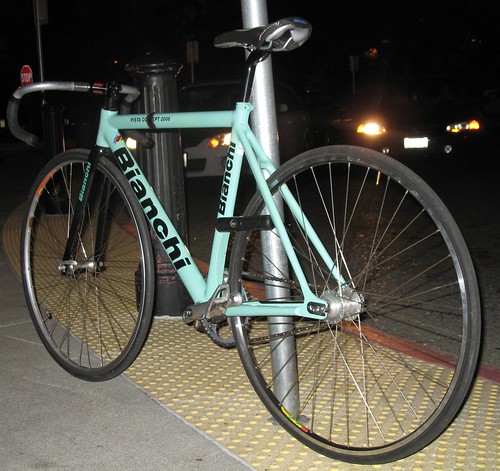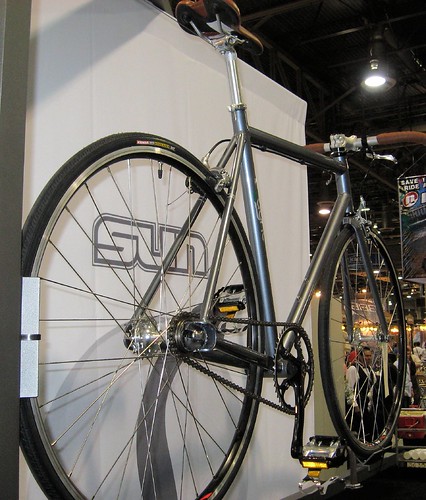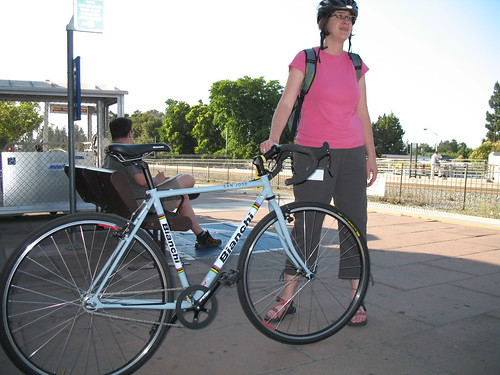These bikes may be illegal to sell in the United States! Do you see the problem with these production bikes? See if you can find it before I give it away below the photos.
Swobo Del Norte
Spot Brand 29er
Cayne Uno
Strida 5.0
Bianchi San Jose
Cannondale Hooligan
This belt drive singlespeed from Lynskey, however, is perfectly legit.

This Trek District is also legal.

This Bianchi Pista is probably legal to sell.

Have you spotted the problem, yet?
In the United States, the Consumer Product Safety Commission produces the regulations for bicycle safety. Any bike sold here must meet the standards published under the Requirements for Bicycles. These regulations are the reason every bike must be sold with a pie plate spoke protector, reflectors, brakes, instruction manuals, and warning stickers cautioning owners not to overtighten the handlebar stem.
Chainguards required
Chainguards are a requirement for “bicycles having a single front sprocket and a single rear sprocket.” That seems to mean that every singlespeed bike and every bike with internal hub gearing — including that sweet singlespeed 29er, your urban fixed gear tarck bike, and the very useful Strida folding bike with belt drive — is required by Federal law to be sold with a chainguard.
This standard dates back 1973, when the nascent CPSC identified the bicycle as the Number One health threat to children (no kidding!). If the CPSC narratives can be believed, one problem is the little darlings apparently kept jamming their foot into the chain, wrecking the bike and injuring themselves in the process. John Forester, among others, has expressed his disdain for CPSC accident investigations.
The CPSC only regulates the sale of new bikes. You can modify it however you want after the sale, which is why so many people remove the dork disk spoke protector and reflectors from their derailleur bikes after purchase.
Exemptions
What about the Lynskey, the Trek District, and the Bianchi Pista? Why don’t those bikes break the law?
The Lynskey is a custom made, built to order bicycle. “One of a kind” bikes like the Lynskey are specifically exempted from CPSC bicycle regulations.
If you look close at Trek’s district, you’ll see a little vestigial chainguard that likely meets the minimal requirements for a chainguard.
Finally, the Bianchi Pista is a real track bike, meant for racing on the velodrome. “Track bicycles designed and intended for competition that have tubular tires, a single crank–to-wheel ratio and no freewheeling feature are exempt,” according to the CPSC regs. I put that bike under “maybe” because the Pista is spec’d with clinchers, not tubulars, but the CPSC fails to define “tubular tires” in their regs so maybe Bianchi and every other track bike vendor can get away with this.
Okay. So what?
This doesn’t directly affect us as consumers. The CPSC rules are only for those in the bike supply chain. If the CPSC ever decides to enforces this chainguard rule, it will increase costs for the bike companies that will probably be passed on to you. The chance of a product recall affecting singlespeed mountain bikes seems silly, but the CPSC forced Cannondale to issue a recall last year when Cannondale forgot to include spoke protectors on some of their road bikes.
Maybe the bike companies are working behind the scenes to update the CPSC regulations. When the chainguard requirement was written in 1973, children bikes weren’t equipped with derailluers, while adult bikes generally were. I imagine the rationale was that adults typically know better than to stick small appendages into moving bike parts. Simple adult “city” bikes and singlespeed mountain bikes are big categories these days, and the increasing popularity of belt drives reduces much of the need for a chain guard.
What do you think? Should the bike industry push the CPSC to modify their regulations? Or should they continue to operate on the down low and hope the Feds continue to ignore them?
Photo credit: Trek District photo courtesy Mark Stevenson aka Guitar Ted; Lynskey courtesy Lynskey Performance Designs. All other photos Richard Masoner.





